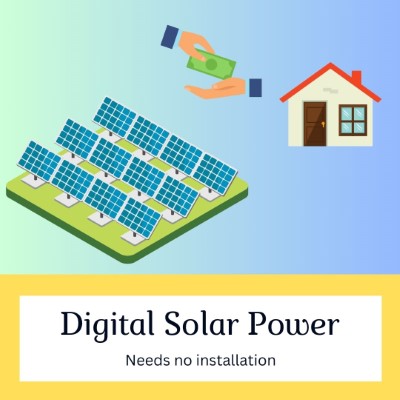What is Digital Solar Power?
Digital Solar Power, often referred to as solar over the internet or solar biscuits, represents a revolutionary approach to harnessing solar energy. Unlike traditional solar power systems that require individuals to install solar panels on their rooftops, digital solar power allows consumers to invest in shared solar plants located elsewhere. This innovative model provides the benefits of solar energy without the need for personal installation and maintenance of solar panels.
Key Points on Digital Solar Power
- Needs no installation
- Go solar instantly
- Maximize Savings
- Zero hassles
- No added costs
- Affordable
Benefits of Digital Solar Power
1. Accessibility and Flexibility
One of the most significant advantages of digital solar power is its accessibility. Homeowners and businesses can participate in solar energy programs without worrying about the structural suitability of their roofs or the upfront costs associated with installing solar panels. This model democratizes access to renewable energy, making it feasible for a broader audience to contribute to and benefit from sustainable energy solutions.
2. Cost Savings
By investing in a shared solar plant, consumers can enjoy the economic benefits of solar power. Digital solar companies share the earnings generated from these solar plants, either by directly compensating energy bills or by providing credits that offset electricity costs. This can result in significant savings, as the energy produced by solar panels is generally cheaper than conventional electricity from the grid.
3. Maintenance-Free Experience
One of the hurdles of traditional solar systems is the ongoing maintenance required to ensure optimal performance. Digital solar power eliminates this concern, as the responsibility for maintenance falls on the company that manages the solar plant. Investors can enjoy the benefits of solar energy without the hassle of maintaining the equipment.
4. Environmental Impact
By investing in solar power, individuals contribute to the reduction of greenhouse gas emissions and the promotion of renewable energy. This collective effort helps combat climate change and reduces our reliance on fossil fuels, paving the way for a greener future.
Starting a Digital Solar Company
1. Market Research
Before launching a digital solar company, it is crucial to conduct thorough market research. Understand the demand for renewable energy solutions in your target area, identify potential competitors, and analyze their strengths and weaknesses. This information will help you carve out a unique value proposition and identify opportunities for differentiation.
2. Business Plan
Develop a comprehensive business plan outlining your company’s vision, mission, and objectives. Include detailed strategies for marketing, sales, and operations. Highlight your plans for financing, including how you will attract investors and manage the funds.
3. Legal and Regulatory Compliance
Ensure that your business complies with local, state, and federal regulations regarding solar energy and investment. Obtain the necessary permits and licenses to operate legally. It may be beneficial to consult with legal experts specializing in energy and finance to navigate this complex landscape.
4. Partnership and Collaboration
Form partnerships with property owners willing to host solar panels on their premises. These hosts will consume the generated electricity at a lower cost, while your company handles the installation and maintenance. Establish clear agreements outlining the terms of these partnerships.
5. Investment and Funding
Secure funding from individual investors who are interested in supporting renewable energy projects. Create attractive investment packages that outline the expected returns and benefits. Transparency and trust are key to attracting and retaining investors.
6. Technology and Infrastructure
Invest in high-quality solar panels and the necessary infrastructure to support efficient energy production and distribution. Leverage advanced technology to monitor and manage the performance of the solar plants remotely.
7. Marketing and Customer Acquisition
Develop a robust marketing strategy to raise awareness about your digital solar offerings. Utilize digital marketing channels, social media, and community outreach to attract potential investors and hosts. Highlight the financial and environmental benefits of participating in your program.
How Digital Solar Power Works
Digital solar companies operate by installing solar panels on the premises of willing hosts, who then consume the electricity generated at a cost 30-40% lower than the standard rates from electricity boards. Here’s a step-by-step breakdown of how the system works:
- Installation and Maintenance: The digital solar power company handles the installation and maintenance of the solar panels on the host’s property. This ensures that the solar panels operate efficiently without burdening the host with upkeep responsibilities.
- Energy Consumption: The host consumes the electricity generated by the solar panels. This energy is typically cheaper than conventional electricity, providing immediate cost savings.
- Investment and Revenue Sharing: The digital solar power company uses funds from individual investors to finance the installation of the solar panels. In return, the company shares the revenue generated from the electricity sales with the investors. This sharing can be in the form of credits to offset their energy bills or direct financial returns based on their investment share.
- Monitoring and Reporting: Advanced monitoring systems track the performance of the solar panels, ensuring optimal energy production and efficient distribution. Investors receive regular reports detailing the performance and financial returns of their investments.

Conclusion
Digital solar power offers a flexible, cost-effective, and environmentally friendly alternative to traditional solar energy systems. By investing in shared solar plants, individuals can enjoy the benefits of solar power without the need for personal installations and maintenance. This innovative approach not only democratizes access to renewable energy but also contributes to a sustainable future. As the demand for clean energy continues to grow, digital solar power stands out as a promising solution for a greener and more economically viable energy landscape.
